Peter MALONE
Saturday, 09 October 2021 12:59
Polka King, The
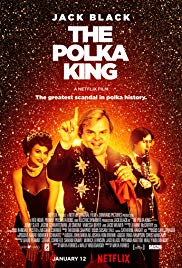
THE POLKA KING
US, 2017, 95 minutes, Colour.
Jack Black, Jenny Slate, Jason Schwartzman, Jacki Weaver, J.B. Smoove, Robert Capron.
Directed by Maya Forbes.
Entertaining film is based on an actual character, Jan Lewan, who had a life in Poland before migrating to Canada and the United States, setting himself up in Pennsylvania, marrying, gathering a band, playing polka music, genially attracting older audiences and, eventually, their giving money for him to invest. An enthusiast, he ignores warnings signs from friends and government about his investments and, ultimately, is indicted for fraud.
The film is based on a 2009 documentary on Jan Lewan, The Man Who Would Be Polka King.
While the screenplay is intriguing in itself, the strong impact of the film comes from the presence and performance of Jack Black, certainly in his element, highly intense, highly enthusiastic, exuberant music, absolutely confident in his abilities – and, dashed, in prison, after the exposure for fraud. But, he does intend a comeback…
There is a very strong supporting cast with Jenny Slate as his wife, a former beauty queen who is persuaded by her husband to enter another competition and then his trying to bribe the judges. Jason Schwartzman is a musician in the band, wanting to get out but cajoled and flattered by Jan. A very strong performance also comes from Jacki Weaver as Jan’s mother-in-law, standing up for her daughter, continually criticising Jan, enjoying her success in being vindictive.
And, all the time, there is the music. But, there is another significant world figure who appears – Pope John Paul II. One of Jan’s schemes is to take the money from his enthusiastic but unwary investors and organise trips to Europe. One of these involves bribing Vatican officials for a group audience with the Pope – which happened (and is featured in the documentary as well).
A film which is both interesting and enjoyable as we watch.
1. A true story? An unexpected story? Jan Lewan and his life? His career, ups and downs, his talents, fraud, prison?
2. The Pennsylvania settings, music and calls, shops, homes, the American town? Travels – to Europe, the Vatican?
3. The important to the music, the traditions of the polka, performance, enthusiastic responses?
4. Jan Lewan, the initial performance, his wife coming on stage, her being a beauty queen? His explanation of his origins, Poland, migration, to the US and Canada, the menial jobs? His music?
5. Jack Black and his vivacious presence? Jan and his marriage, and the bond with his wife, his son? The exhilaration of his performances, success, the members of the band, Mickey, the clarinet, his talking with Jan, wanting to quit, persuaded to stay? The issue of the dancing pair and its performance? Jan and his connection with the crowd, the elderly crowd, the ethnic crowd?
6. His wife, the jewellery, his shop, the advertising, the enterprise, the souvenirs, the Polish clientele, more money?
7. The elderly couple, wanting to give him the money, is setting up the trust, the continued donors? Legalities and legalities? The authorities coming for warnings about what he was doing?
8. The increase of deposits, his lifestyle, his wife and her enjoying the lifestyle but not necessarily knowing what he did? His son?
9. The idea of the tours, the groups, going to Europe, travelling around, the episode at the Vatican, his giving the money to bribe the officials, Pope John Paul II and the audience? Success?
10. The government agents, Mickey and his reluctance, the pizza shop, Mickey pizzazz? Jan, performances, tours, records?
11. Jan and his status, extroversion? His wife and the beauty pageant, wanting to bribe the judges? The consequences?
12. The ever-presence of his mother in law, her personality, her sardonic comments, criticisms?
13. The law coming down on him, reality, the exposure, the breakup of his marriage, dealing with his son, going to prison?
14. His subsequent history, resilient?
Published in Movie Reviews
Published in
Movie Reviews
Saturday, 09 October 2021 12:59
Watch the Sunset
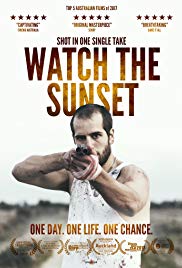
WATCH THE SUNSET
Australia, 2017, 78 minutes, Colour.
Tristan Barr, Chelsea Zeller, Michael Gosden.
Directed by Tristan Barr.
This is a small story which begins in Melbourne, travels through the Victorian countryside to the town of Kerang. In terms of technique, the film is something of a tour-de-force, the whole narrative filmed in one take. The director also indicated that everyone participated in a full rehearsal which was actually filmed just in case anything went wrong with the fully professional filming the next day.
While the film has action, there are long periods of quiet, of driving and focus on the drive, on the passing countryside, enabling audiences to reflect on what they are seeing – which, of course, involves the danger of the audience which is desperate for action to opt out or find these sequences tedious.
The opening is strong, a collage of footage about the drug culture, addicts, treatments, newspaper and television reports about those caught up in the drug world.
It emerges that one of these is the driver of the car, played by Tristan Barr who also collaborated in the screenplay and is the director. He has rescued a young woman, an addict, and drives her to the country town to place her in a motel and get away from the drugs.
There is an unexpected sequence in the town after the driver has sequestered the woman. He goes to the local church and listens to the choir. This leads to some considerable drama because one of the women in the choir is his wife who goes to pick up her daughter from school. The audience feels the tension between husband and wife, a mixture of desperation and love, arguments and regrets, intimations of hope.
The tension actually mounts as the wife’s brother and his friends, ideologically committed to the drug culture, abduct the daughter, exert standover tactics, especially concerning money.
There is a buildup to violence.
While the subject material is familiar, it is presented with a vigour as well as the intensity of the continuity of the single take.
There is a sunset at the end and a conclusion that might not have been expected or hoped for.
1. A small budget feature? The significance of the single take? The cast? Editing? The musical score?
2. The sequences of Melbourne, the heroine and ice addicts? Graphic? Driving the Victorian countryside, the town of Kerang, the motels, church, the yard, houses?
3. The title, whether addicts would reach the sunset? A life and fate? Choices?
4. The impact of the initial footage?
5. The girl, the influence of the drugs, out of it, in the back of the car, Danny driving, the long take of the drive, arriving in the town, depositing her in the motel?
6. Danny, his character, drug background, moving out, getting the girl, delivering her to the motel? Indications of his personality? Going to the church, at the back, Sally in the choir, her walking out, his confronting her, her collector her daughter from school, upset with the teacher? Danny taking his wife and daughter? The discussions, her going to play, her being abducted by her uncle? The pursuit, finding the address, collecting the addicted girl, in the back of the car, her getting the rifle? At the house, confronting Shane, his talking ideology of belonging to the group? Is associate and violence? The girl, her being abused in the past, her being shot? The confrontation with Danny, the gun to his head, Sally shooting her brother? The escape? Take his daughter, the rescue, promising the holiday? The current pursuit, the shots? Danny’s emotions throughout the day? Sending his wife and daughter ahead, dying on the road?
7. Sally, her past life, marriage, her daughter? Separation from Danny? Caught up in the action, the abduction of her daughter, the final shooting?
8. Her brother, the addicts, their code, brutal?
9. The style of the film, slow-moving, subdued sound times? The claim, audiences identifying with characters and plot, drug issues, emotional identification? Learning?
Published in Movie Reviews
Published in
Movie Reviews
Saturday, 09 October 2021 12:59
Lambs of God

LAMBS OF GOD
Australia, 2019, 200 minutes, Colour.
Essie Davis, Ann Dowd, Jessica Barden, Sam Reid, Daniel Henschel, John Bell, Kate Mulvaney, Damon Herriman.
Directed by Jeffrey Walker.
Lambs of God is a television series based on a novel by Marele Day adapted by actress, writer, director, Sarah Lambert. It was filled in rugged terrain in Tasmania. The director is Jeffrey Walker who has directed a considerable number of television series including Dance Academy subsequent feature film. He also directed several of the Jack Irish telemovies. He received some acclaim for his comedy, Ali’s Wedding.
While the setting is an island off the British coast, the time is 1999. However, the ruins on the island of a monastery are inhabited by three nuns, the order of St Agnes, with the play on words from Latin for lamb, agnus, and the lambs of God. The community is very strange indeed, feminist in its way, regarding the deity as female, prayer and Scriptures, but also practical life in tending lambs which are seen as the incarnation of deceased sisters. Essie Davis portray Sister Iphigeneia who is in charge. Ann Dowd, who made such an impact in The Handmaid’s Tale, is the elderly Sister Margarita. British actress, especially from British television, Jessica Barden, is a young ingenuous junior sister.
However, life on the island is disturbed by the visit of a rather self-important priest, Australian actor Sam Reid. While he belongs to a rather hierarchical church, especially exemplified by a haughty John Bell as the Bishop, he brings a modern tone, the diocese wanting to claim possession of the island and turn it into a tourist resort.
While the situation and the characters are somewhat exotic, the development of the narrative is not what the audience might have expected, the imprisonment of the priest, the concern of his former drug addict sister and her reliance on the local police (Kate Mulvaney and Daniel Henschel), the Bishop’s intervention, his somewhat thug assistant priest (Damon Herriman).
Sister Iphigeneia is rather mysterious but audiences will begin to suspect aspects of the presence of the young sister. There is a further development went Sister Iphigeneia goes to confront her mother, Sigrid Thornton, to raise money to pay for the island. Certainly, off-putting images of the Catholic Church. Bizarre aspects of an enclosed spirituality. And a great deal of melodrama.
1. The title? The nuns as lambs of God – and the reincarnation of the dead nuns? The symbol of lamb of God from the Bible? The Latin Agnus Dei? The order of St Agnes? Issues of sacrifice, the sacrifice of the lambs, and communion with them? How intelligible the narrative and background for non-Christian audiences? Christian audiences?
2. 1999, the United Kingdom, the coast, the town, the police centre, the bars, homes? The island, old, the ruins? The brambles and the vegetation? The parts, the causeway? The sea? The Cathedral, the church and offices? The blend of the old with the 20th century into the 21st? The musical score, songs, hymns and chant?
3. Audience knowledge of Catholicism and traditions? Or not? Conference, nuns, habits? Rituals of prayer, community life, cooking, meals? Orthodoxy? Authenticity? The church of the Bishop, formally dressed, formal and severe in his manner, interested in power and finance, not pastoral? The worldly interest? The priests, classics, narrow outlook, superior? Bob as henchmen and thug priests? Priests, vocations, ministry, obligations of celibacy?
4. The setting, the three nuns as characters, ages, the mystery of her their being there, the origins of the order, lifestyle, no modern conveniences, looking after the sheep, the symbolism of the sheep, shearing, the wool, knitting, killing the sheep, consuming the sheep, killing day? The meeting, Eucharistic, the drinking of the blood? St Agnes, child, violated, the brothel, executed as a martyr? The female perspective of this religious congregation and their perspective on God, female?
5. The device of fairytales and their being recounted, Beauty and the Beast for Margarita and her experience, flashbacks to the past, the rape, the silhouette of the Beast as a devil? Her sense of sin, a touch demented? The story of Snow White, Iphigeneia, her jealous mother, her growing up, beauty, her love for Jeremiah, the Huntsman pursuing them, killing Jeremiah before her eyes? Then her disappearing? Carla, the story of Briar Rose and her preservation? Ignatius telling the story of the prodigal son, an allegory for what had happened to him? Their life stories through fairytales, and their weaving them into the garments?
6. The sudden arrival of Ignatius? The hard journey, the car of the causeway, the brambles, the nuns and the reaction? Ignatius proper, classic, but relying on his phone? The mystery of his visit?
7. The church situation, the presentation of the Bishop, wanting to buy the island, setting up the resort, the brochure and the glamour? The nuns and their treatment of Ignatius, and his spitting, the wine, the meal and the lamb? Sleeping with the sheep? His clothes? The worsening situation, his harsh attitude, wanting the phone, Carla with the phone, his injuries, the decision to keep him, putting his leg in the cast, his being trapped?
8. The Bishop and his character, his assistants, severe personality, autocratic? The interviews with Barnaby? Wanting the investigation secret? The reluctance about giving money, financing the helicopter? Bob as an assistant priest, seemingly innocuous, but a spy, his presence at the memorial, the commission by the Bishop, his going to the island, infiltrating, on the island?
9. The nuns, Margarita, her age, her flowers and strictness, visions, the madness, the story of Beauty and the Beast, the flashbacks, the image of the beast as satanic?
10. Iphigeneia, 25 years on the island, in charge, decision-making, relationship with the other sisters? Her having visions? Carla, her age, ingenuous and innocent? Yet elements of sexuality?
11. Iphigeneia, the situation, the buying of the island, her going to look at the files, the newspapers, her life, the Snow White story, her vain mother, the affair with Jeremiah, the Huntsman and his killing of Jeremiah? The decision to leave, going to the hotel, the encounter with the lawyers, the explanation of the deal, interactions with her mother? The press conference, leaving the letter for her mother, checking on the property and bequest to the next of kin? The plan?
12. Carla, her age, innocent, left in the basket, her naivete, living according to the rules, the relationship with the others, the works and the lambs, taking Ignatius’ phone, the attraction to him, her being sheltered, sexual arousals?
13. Ignatius, his options, to die or to become part of the community, ordered to knit, the instructions, his new clothes, his being washed? the shell and his loosening the plaster? Knitting, Margarita and her anger with him, Carla and her help implement it? Passing of time, acceptance, his telling the story, his version and interpretation of the prodigal son?
14. The helicopter flying over, Carla learning about Frankie, explaining his sister, getting the phone, phoning the Bishop, the call of the time of his memorial?
15. Frankie, the situation, her back story, the two as children, alcohol, drugs, AA, her children, wanting to reconcile with Ignatius? Not believing that he was dead? Her continually challenging Barnaby? The AA meeting, Bob and his presence, going home, his getting her to drink, his wanting her to talk? His plan?
16. Bob, commissioned by the Bishop, going to visit the sisters, the sinister encounters, through the brambles, falling to his death?
17. Iphigeneia, the sisters, pushing the car into the water, avoiding the helicopter? Coming back to the island, the boat, the oarsmen, the memories of the past, the sexual encounter, Carla’s birth?
18. The group together, in peace, Ignatius becoming part of the community, his being officially received, vows, the knitting, into the future? Relationship with Carla?
19. 20th century Gothic story – with bizarre religious overtones?
Published in Movie Reviews
Published in
Movie Reviews
Saturday, 09 October 2021 12:59
Too Late
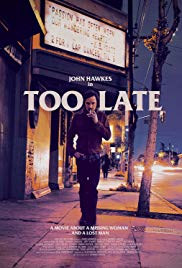
TOO LATE
US, 2015, 107 minutes, Colour.
John Hawkes, Crystal Reid, Dichen Lachmann, Natalie Zea, Dash Mihik, Joanna Cassidy, Jeff Fahey, Robert Forster, Sydney Tamila Poitier, Ride a Strong, Vail Bloom.
Directed by Dennis Hauck.
Since the 1990s and the release of Pulp Fiction, a thriller which is not constructed in strict chronological order is often described as Tarantinoesque. This is particularly true of this thriller.
It is been filmed in five 20 minute segments – but not presented in chronological order. This can be tantalising dramatically for the audience – but also irritating for some who find it too difficult to follow.
A young stripper is murdered in a Park in Los Angeles. She has been seen with two drug dealers as well as a Park Ranger. We find that she has approached a private detective who then feels obliged to investigate the case. This involves him in dealing with an arrogant owner of a club and his associate, the mother of the girl, other connections with the girl. And, as with Pulp Fiction, we have to be alert as to which of the segments contains the ending.
The film has a very strong cast led by John Hawkes as the private detective. Perhaps too experimental for many general audiences, but interestingly tantalising for those who appreciate the Tarantinoesque.
1. 21st-century film noir, filmed in Los Angeles sunshine as well as darkness?
2. The complexity of the plot? Audiences having to fit the jigsaw pieces in time chronology? The impact of seeing the plot not in chronological order? The demands on the audience in making connections?
3. The technical bravura of the film, five chapters, single takes of 20 minutes or more? The amount of plot in each chapter? The behaviour of the characters in each chapter? The complexity of the situations? The audience having to go backwards and forwards in time to appreciate the narrative?
4. The noir plot: strippers and dancers, clubs, owners, exploitation; the private detective, the past encounter with the stripper, her asking his help, the discovery of her body, his interviews, parents, grandparents, club owners; the introduction of the Ranger, the two drug dealers and thinking the stripper had overdosed on their drugs; the behaviour of the detective, the solving of the situation, the final effect on him?
5. Sampson as the private detective, John Hawkes and his screen presence, appearance, life and investigations, asked for help, visiting the clubs, the encounters with Dorothy, her death, the deals and the Ranger, Gordy and the clubs and his associate, other dancers, mother and grandmother? The final year passing, the driving, the encounter, death?
6. Dorothy, the situation, the clubs, stripping, men, seeking help, her family, her death?
7. The club owner, his wife, sex and compromise, revenge, Fontaine as his associate? His wife killing him and the associate, affluence and sleaze?
8. The drug dealers, incompetent, feeling guilty, running away?
9. The women in this kind of story, the grandmother, incompetent mother, dancers and strippers, murder victims?
10. Commentators making the Tarantino link, the shifting of times, the demands on audiences, the lengthy moments of dialogue, tongue in cheek and ironic?
11. The success of the film as a 21st-century film noir?
Published in Movie Reviews
Published in
Movie Reviews
Saturday, 09 October 2021 12:59
Black Cop
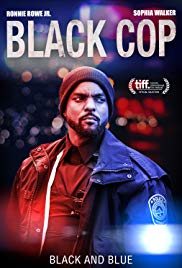
BLACK COP
Canada, 2018, 91 minutes, Colour.
Ronnie Rowe.
Directed by Corey Bowles.
As the title indicates, this is a film about a police officer, a police officer who is black. However, it is by no means a run-of-the-mill police investigation story. It was written and directed by Corey Bowles, based on a short, 11 minute film of the same title he had made some years before.
The film is working significantly on two levels. On the one hand, there is the visual style of the film, a great number of close-ups on the policeman, on his face, relying on expressions, mainly impassive, some full of anger. More of the film takes place in the dark than in sunlight. There is also the device of the voice-over of the policeman, telling the story of his relationship with his father, ultimately revealing that he is a policeman, the demands of his father, the son’s admiration for him. But, there is a great deal of explanation about the policeman, his character, his experiences and attitudes. There are quite a number of songs in the background with significant lyrics. And, the screen goes dark quite a number of times to let the audience have time to reflect on what they have seen, how they are responding, before the action resumes.
Ronnie Rowe is a strong presence as the Black Cop. The action takes place over a short time, the audience getting to know the cop and his personality, something of a loner while still working with officers at the precinct, experiencing some racial taunting, trying to give advice to the young woman who is spending her first days in the office.
As regards narrative, we see the cop in action, initially with a teenager whose bike has been stolen – and he gives the impression that he might be lying but, in fact, he is not and, ultimately the cop returns his bicycle to him after it has been run over. There are quite a number of ominous people present, looking at the policeman, giving him the finger, talking about him – and these are mainly black.
The film focuses on the key incident where the cop is walking home, hooded, listening to music, accosted by two white policeman who seem to assume that there is something criminal about him. He defies their interrogation – they have guns, he does not explain who he is until there are many tense moments and they finally cuff him, then discovering the truth. The point is made about how black men find it difficult to walk down the street, are assumed to be dangerous or criminal by the white officials.
This episode has an effect on the cop that he then turns his anger (we see him also with energy outlets in some fierce gym exercise and boxing) on white people, treating them as white cops treated him. He goes to the rescue of two young black men who are being accosted by a violent white policeman, letting them go, attacking the policeman and taking his uniform and disposing of him in the garbage bin. He accosts a jogger who turns out to be a doctor, who is puzzled by being held up, is treated violently and then let go. There is also a couple in a car, she defiant when the car is stopped, the cop violent towards her male passenger, and treating her roughly with the interrogation, giving them a ticket and demanding that they go to the police station. He also accosts a young white man on a path, the man frightened, eventually weeping, let go and running away.
The young rookie at the police station is suspicious of him, interrogates him and he gives some justification of his stances.
A film that is different in terms of police work, and a strong critique of racial profiling.
1. The title, expectations? The film different from what is expected? The screen presence of Ronnie Rowe?
2. A Canadian film, American racial settings, the town, the streets, homes, the highways? Police precincts? The gym? The musical score – the range of songs and lyrics played throughout the film and in the cop’s car?
3. The visual style, the close-ups, the darkened shadows, the fierce gym boxing episodes, the cop at home, the screen going black, time for the audiences to reflect, the voice-over and explanations? The editing and pace? Real with the touch of the surreal?
4. The cop, explanation of himself, as a policeman, the impact of his father, the revelation his father was police? A loner? At the station, looking at the man waiting in the street, the flippant attitudes of the white policeman, the young black rookie and her first day – and her later accosting him with the gun?
5. His experience with the white police, their suspicions, their rough treatment, menace? His not answering them? Cuffing him? The revelation of the truth? Their still blaming him? Audience tension on his behalf?
6. The impact, his treating white people in the same way, the jogger, rough treatment, explanation that he was a doctor, violence, letting him go? The two young black men accosted by the white policeman, his attack, letting them go, taking the uniform, dumping him in a bin? The couple in the car, his treatment, violent towards the man, rough with the woman, their sitting on the ground, the ticket? The young man on the path, suddenly stopped, puzzled, fearful, weeping, running away?
7. The impact for the Black Cop, racial profiling, his becoming victim? His victimising of the whites? The conclusions for the film audience about such profiling, the behaviour of police?
Published in Movie Reviews
Published in
Movie Reviews
Saturday, 09 October 2021 12:59
My Brother... Nikhil
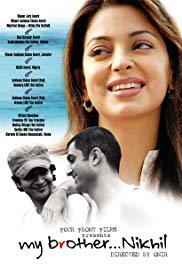
MY BROTHER… NIKHIL
India, 2005, 120 minutes, Colour.
Sanjay Suri, Juhi Chawli, Purab Kuhli, Victor Bannerjee, Lillette Dubey, Gautam Kapoor.
Directed by Onir.
This film has a reputation for being the first Indian film to deal with issues of homosexual orientation – released in 2005 and, so, rather reticent in the dramatisation compared with films coming soon after, in language, sexual reference, dramatising behaviour. This can be seen in further films including Loev, and the quite effective drama, Evening Shadows.
The film is based on actual characters, a swimmer in Goa. Names have been changed.
The film uses the device of interviews with members of the family and friends, talking to camera, which is quite effective and draws the audience into understanding and some sympathy.
The film has many flashbacks to Nikhil and his sister who is one of the key narrators. They have a playful childhood, a devoted mother, a somewhat stern patriarchal father. Nikhil is successful in swimming, winning competitions, pleasing his father. However, again in a rather reticent seen, he goes to see a doctor who warns him about the diagnosis of a blood disease – not immediately spelling out that Nikhil is HIV Positive. He is put down from the swimming team, become suspicious around the city, his parents are ridiculed when they go out to dinner.
There have been a number of films about the early years of HIV and AIDS – from various countries and cultures. Indian culture, which has had legislation against homosexuality, does not have the awareness of how to deal with the new infection in the 1980s and 1990s. An interesting comparison would be to look at the Australian film, Holding the Man, where the central character dies in 1992 and his parents wanted to be known that he died of cancer at the time of his funeral.
Nikhil is arrested, confined to rather squalid surroundings, subject to rough treatment as well as ridicule by the authorities. His sister consults a lawyer who then takes up a campaign as to the sister and Nikhil’s boyfriend, Nigel. They are supported by the school principal and new kill is freed.
The interviews move from the late 1980s into the early 1990s and back and forth. His parents want no contact with their son. His sister and her husband are very supportive as is Nigel. However, Nikhil’s health deteriorates and he suffers from AIDS. Eventually, his parents returned from Mumbai after several years to Goa. His mother does come to visit him, his father not. However, there is some ultimate reconciliation and Nikhil is welcome to live with his parents until he dies.
The film notes that the sister and Nigel continue to work for organisations helping those who are HIV.
The film has quite an emotional pull – but is a strong reminder, in the context of India, of initial reactions to and fears of HIV and AIDS.
Published in Movie Reviews
Published in
Movie Reviews
Saturday, 09 October 2021 12:59
Booksmart
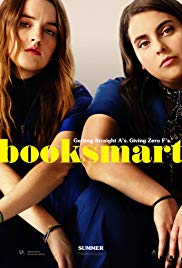
BOOKSMART
US, 2019, 102 minutes, Colour.
Beanie Feldstein, Kaitlyn Dever, Jessica Williams, Jason Sudeikis, Lisa Kudrow, Will Forte, Mason Gooding,
Directed by Olivia Wilde.
Depending on your age and your response to teenage comedies, high school comedies, your reaction might be “great, another one� or a groaning “oh no!�.
For many older audiences, the response might be the latter.
However, Booksmart turns out to be somewhat different (what a relief!).
The action takes place over a period of about 24 hours, the day and night before high school graduation. We are introduced to two of the students, friends for years, Molly (Beanie Feldstein, sister of Jonah Hill, and it might be very enjoyable to see them together in a film) and Amy (Kaitlyn Dever). Molly is always very much in charge, Amy in support. It emerges that they have loved study, that they actually are book-smart, have plans for their future, but tend to be ridiculed by fellow students. There is a particularly awkward scene where Molly is in the toilet and overhears a group mocking her, carving her up. (And, woe of woes, all the students, despite slacker attitudes and behaviour, already have places in prestige colleges.)
The crisis for the night is that the two girls realise that they have been all work and no play, that they have missed out on socialising. So, they plan to go to a party (but don’t have the address and are reliant on getting it from a pizza house with their deliveries – the manager who reprimands them for their behaviour later gets his comeuppance in a most unexpected way).
In comparison with so many of the parties in the raucous comedies, this is a somewhat quiet and better-behaved affair. However, Molly who has a crush on her rather playboy student VP student becomes disillusioned with him. Amy, who has come out as lesbian, has a crush on one of the students who disillusions her. Surprisingly, this leads to a rather strong scene where Molly and Amy have a very public fight, a shouting match and denunciations in front of everyone.
So, how will graduation day turnout? Awkwardly, at least at the start, because Amy has taken the initiative to draw off the police who raid the party enabling everyone else to escape but her finishing up in jail. Molly comes to rescue her, mutual apologies – and hurrying on to the graduation.
The film is carried by the performances of the two young women. It is something of a relief to see a film which indicates that there is more to school and college years than drinking, drugs, sex, wasting opportunities. Somebody remarked that this is the kind of film that parents prefer to watch and may prefer their children to watch.
1. Teenage comedy? For teenage audience? For a parents’ audience? Comic and serious?
2. The title, Molly and Amy as booksmart? All study but no play?
3. The traditions of teenage comedies, raucous and crude? The elements here? But a different context? The suggestion that this is the kind of image parents might want to see?
4. The town, homes, school, the party? The feel of the town?
5. The musical score, the range of songs, nostalgic?
6. The two girls, their age, friendship over the years, studious, Molly controlling, president of the students, Amy complying, later accused of being a coward? The bond between the two girls? Plans for the future, graduation, college, Amy going to do work in Botswana?
7. Molly, her crush on the vice president of the students’ group? Amy, the same-sex attraction, her coming out, her crush on Ryan, but remaining at the level of crush? Molly and unrequited crushes?
8. The last day, the discussions with the headmaster? His dismissing them? Miss Fine, her own personal story, encouraging the girls, their ringing her for rescue, giving them the dresses for the party, going to the party, the attraction to the Latino student, the sexual encounter, the later talking with him at the graduation?
9. At school, the treatment of Molly and Amy by the other students, talking about Molly in the toilet and her overhearing all the criticisms? The fact that the slacker students were all accepted to the best colleges, the issue of study versus partying?
10. The two girls’ discussion, the decision to go to the party, to make up for lost time, the difficulties in getting the address, the idea for the pizza order, the pizza man, their disguising themselves with their long hair as a mask, his threats and telling them to behave? The extra irony of his being the local strangler?
11. Miss Fine, and her taking them to the party?
12. A comparatively subdued party, much less of the usual raucous behaviour?
13. Molly, seeing the vice president, the games with him, his interest in Harry Potter, their bonding, yet his going off, flirting with Ryan, Molly’s reaction? Amy and Ryan, flirting, swimming, seeing Ryan with the vice president, upset, meeting the lonely girl, the critique, the kiss, the vomiting?
14. The two girls creating a scene at the party, the loud quarrel, accusations?
15. The police raid, Amy volunteering to act as a decoy, her finishing up in prison?
16. Molly waking on graduation day, going to the prison, the frank talk with Amy, the apologies, giving information about the strangler? Their getting out?
17. Their dorky friend, seen giving the gift to Miss Fine even though he was not in her class? His helping Molly? Taking her place at the ceremony, his justifying his background and the false rumours, his reading of the speech? The details of Molly’s speech, the feminist tone and his presenting it?
18. The car, driving fast, the crashing entry? Molly’s brief speech?
19. Amy’s parents, their pampering her, the toy bear?
20. To the airport, Amy to Botswana, Molly leaving – the return at the airport? The future of the girls?
21. Interesting that beneath the raucous there were more serious undertones of study and responsibility?
Published in Movie Reviews
Published in
Movie Reviews
Saturday, 09 October 2021 12:59
Third Wife, The
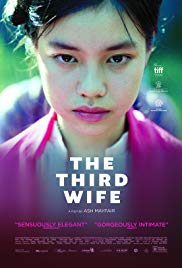
THE THIRD WIFE
Vietnam, 2018, 96 minutes, Colour.
Nguyen Phuong Tra My.
Directed by Ash Mayfair.
The setting is Vietnam at the end of the 19th century.
We are invited into a rather enclosed world and the Vietnamese countryside, a countryside of beautiful scenery and surroundings. We are in a wealthy home, beautiful exteriors and interiors, a family, and many servants scurrying to and fro as well as a farm, farm animals, crops and harvest. There may be an outside world but we stay within the confines of the property.
Behaviour is generally decorous, manners refined and formal, surface propriety and elegance.
And we are introduced to the 14-year-old May, the third wife of the patriarch of the house. He has several children by the first wife, a son of marriageable age, some sometimes irrepressible daughters. The first wife is the lady of the house, well-mannered, accepting her role, sympathetic to May and making her at home in the household. The second wife stays rather in the background.
With this portrait of the late 19th century, this 21st-century film actually has a lot to say about the dominance of men, some misogyny, sexual exploitation of women, the consequences of polygamy, the role of children in this kind of family setting.
While in many ways the plot is straightforward, complications continue to arise which challenge our perceptions of the characters and their behaviour and the consequences of their behaviour.
May, at this young age, has much to learn and, by and large, the family and the servants help her. There is the initial sexual experience and her feelings. There is pregnancy which is honoured – with May growing in understanding, especially of her feelings and emotions, and an unexpected attraction to the first wife.
Of course, behind-the-scenes, there are also emotional complications, two of the servants and their liaison, her head being shorn, his being beaten. And the son of the family has arrived at the age of marriage but is unwilling, a bride and dowry chosen, sight unseen, some tragic consequences.
These themes are not unfamiliar but it is watching and trying to understand them in this Vietnamese context, in this past culture, that makes the film so arresting and challenging – even to the final enigmatic close-up and our asking who is May and what is to happen to her, whether she has choices or not.
1. The title? The character of May, her position in the household?
2. The Vietnamese story, going back to the 19th century, history, traditions?
3. The location photography, the beauty of the surroundings, the home and the touch of the mansion, the wealth? Work on the farm, within the house? The range of servants in the household?
4. The 19th century, manners, style, traditions? Costumes and decor? Manners? The Buddhist background, statues, prayer?
5. The lifestyle, the delicacy, decorum, formality, rituals?
6. The initial focus on May, aged 14, the innocence, expectations about her role as the wife, in the household, the photo of the household? The other wives, the girls, the son at marriageable age? The initial reception, her welcome? The marriage night, the aftermath, the cloth with the blood and its hanging on the line, symbolic? Her initiation?
7. The film focusing on a women’s world, the presence of the husband and the son, some of the servants, but predominantly women? In both classes? A lot of women’s talk, place in the family, expected roles, subservient? Marriage, menstruation, pregnancy? Women’s focus?
8. The father of the family, his father, old, the women attending him in his old age? The father, in the background, with his wives, with his son and the expectations of marriage? The dealings with the father of the intended bride? His treatment of the servants?
9. The detail of life and routines, of work, May fitting into the routines, the pregnancy, her riding the horse, the experience of birth? The care by the first wife?
10. The character of the first wife, her life, place in the household, her dignity, her daughters and son? The second wife in the background? Not producing a son?
11. The son, not wanting to marry, not wanting to marry someone he did not know? The meeting, the dowry? The marriage night and the non-consummation? His father reprimanding him? The dismissed wife disowned by her father, hanging herself, the funeral?
12. The servants, their various duties, the sexual encounter between the pair? Her head being shorn, his being beaten?
13. May, sexuality, the affection for the first wife, the awakenings of same-sex attraction? The reaction of the first wife?
14. The birth, the aftermath? Feeding the baby/not? The baby crying? May with the child in the fields, the poisonous flowers? The audience sharing her emotional dilemma? The final image, the symbolic cutting of the hair? May’s future?
Published in Movie Reviews
Published in
Movie Reviews
Saturday, 09 October 2021 12:59
Listen to Me, Marlon
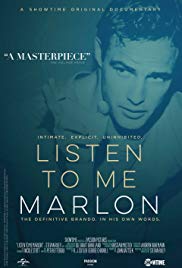
LISTEN TO ME, MARLON
US, 2015, 103 minutes, Colour.
Directed by Stevan Riley.
As time passes, 20th century actor, Marlon Brando, and more and more of cinema history. Not that he wasn’t part of cinema history while it is a and being seen on screen.
Left a rather large heritage of audio tapes, a strong basis for this documentary. Also made remarks about digital lighting documentation on tape and the film uses the device of creating a kind of holographic image of his talking head.
The film offers a portrait of Brando over the decades as well as an outline of his career, especially in film.
There is some detail that his life in Nebraska, his alcoholic mother, his harsh father, his moving to New York City, his success on stage, his move into a film career, excerpt from his films in the first half of the 1950s, especially with his Oscar-winning performance in On the Waterfront. (It is an omission, whether edited for television release or not covered, the period from the mid-1950s, after Guys and Dolls, moving to The Mutiny on the Bounty – with no reference to such films as sayonara, Teahouse of the August Moon, The Young Lions and his directing and acting in One-Eyed? Jacks.
There is also his divorce, the birth of his son, his preoccupation with Tahiti the, his disdain for Mutiny on the Bounty. His marrying, the birth of his daughter. There is an emphasis on his social concern in the latter part of the 1960s.
However, there is a great deal on his comeback with The Godfather and his winning an Oscar, the impact of his making Last Tango in Paris.
While there is reference to his further career, Superman, his clashes with Coppola for Apocalypse now, The Formula, the main part of the film at this stage concerns the trial of his son and its effect on him, his testimony, the suicide of his daughter.
Brando’s life and career told off, a very large, but still left fine heritage of theatre, cinema performances – a most significant figure of 20th century cinema.
1. Audience response to Marlon Brando, esteem for him, questions about him?
2. Marlon Brando’s reputation, in his younger days, during his film career, latter years, court cases, career collapse, personal collapse?
3. The 20th century portrait, American, from the midwest, alcoholic parents, harsh father, studies, to New York, immediate success in the theatre, reputation, moving to films, his significant career roles, Oscar? The meeting with and Anna Kafshi, the relationship, stormy, their son? The importance of Tahiti, filming there, his relationships, his daughter? His becoming troublesome? Fewer film roles? His social concern, Native Americans? The comeback with The Godfather, Last Tango? The ups and downs of his personal life, relationships, the court cases and his son? The suicide of his daughter? The clashes with Coppola and Apocalypse Now? His gross appearance, manner, failing film roles?
4. The film with the range of photos from all periods of his life, appearances on the media, film clips?
5. The importance of the audio, the title, the images of the digital face and his comment on this? Being used throughout the film, reminders of the audiotapes and his living through them? The skill of the editing and the effect of Brando’s voice?
6. The portrait of his family, his mother and drinking, his severe father, the meeting after his winning his Oscar, his father’s comments?
7. Brando as a person, attractive to people, his relationships, casual, permissiveness? Children?
8. The background of his success, his look, stage career, his status in the 50s and comments on him? (The film and no treatment of his life and films from the mid 50s to 1960, including significant roles and directing One-Eyed? Jacks?)
9. The lack of roles in the 1960s, his personal life in Tahiti, his criticisms of Mutiny on the Bounty, of working with Charles Chaplin?
10. His social work, the audio interviews about this? His Oscar for The Godfather and the Indian coming to refuse the Oscar and voice his social concerns?
11. The sequences from The Godfather, his tests, performance, winning? The clash with Coppola and Apocalypse Now?
12. His son, the court case, his presence, speeches? The suicide of his daughter?
13. The final years, decline in film roles, decline in age, weight? A low-key and to his life and career?
Published in Movie Reviews
Published in
Movie Reviews
Saturday, 09 October 2021 12:59
Outside In
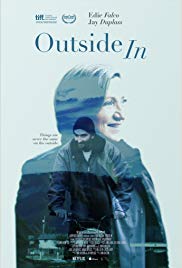
OUTSIDE IN
US, 2017, 109 minutes, Colour.
Edie Falco, Jay Duplass, Kaitlyn Dever, Ben Schwartz, Stephen Leggett,
Directed by Lynn Shelton.
An arresting title – indicating feeling of prison experience while one is outside the prison.
This is a very effective small, independent film, written by the director Lynn Shelton along with star, J Duplass (who often works, especially in producing, with his brother, Mark Duplass).
Duke Glass portrays Charlie, getting out of prison after 19 years, returning to his hometown of his family who have not been particularly interested in him while in prison. However, his teacher, Carol (Edie Falco) has worked for some years preparing documents for his release.
We have a very effective of a man someone at a loss, who is age from 20 to 40 in prison. He looks for jobs, meets up with his brother, is infatuated with Carol whose marriage is breaking down and her wanting to do something even well worthwhile. There is also the teenage daughter played by a blend Dever (book smart).
The film builds its impact rather slowly and steadily, even quietly, but by the end of the film captures the experience with Charlie, Carol and her search was not something more, and life in a quiet American town.
1. The title, inside prison life, out? And people imprisoned in the outside life?
2. Washington State, Granite Falls, the town and its look, the streets, the Rockies in the background? Homes, sheds, school, clubs? The feel of the town? The musical score?
3. Chris’s story, the past, aged 20, the killing, his being a bystander, becoming involved, sentenced to 20 years? The background of his family, the few visits and interest while he was in prison? The contrast with Carol, his past teacher, the phone calls each week, her taking up his course, getting the documents, boxes of them, his release?
4. Chris and his return, meeting his brother, tension between them, the party, all the relatives? His going to see his parole officer, conditions? His apartment? Work applications? Going to see old friends – and the preoccupation with their children?
5. Chris has a character, personality, pleasant, his hopes, reliance on Carol, the affection?
6. Carol, her age, her life, skill as a teacher, her social concerns? The loss of love between herself and her husband delete shared with the paper strains, his slack attitudes, his expectations of her and the marriage? Hildy, her age, ignoring her mother? Discussions in the family, her frustration?
7. Chris, issues of sexuality, his brother’s girlfriend and her teasing him with her foot? His reaction? Meeting Hildy, affection for her, their talking, inviting, her room and the decorations with the paper strips? Taking her to the party, drinking, sharing his life story with her?
8. Carol’s life at school, teaching the children well, Russell and the staff in the common room, the support?
9. Carol, her reaction to Chris going out, Tom’s reaction? Chris and his proposal that he and Carol go out, for the night, the going to the club, the dancing, the confiding, the return, the buildup to the sexual encounter, hesitance, yet the impact from Carol helping him? The morning after, Tom and his attack, Hildy seeing what was going on, Carol and her apology to Hildy?
10. The effect on Carol, keeping her distance, Tom moving out of the home, the searching for Hildy and asking Chris, finding the rooms with the coloured strips? Talking with her daughter, the daughter going to college?
11. Chris, and ordinary life, with the job, Carol talking with him, his wanting an ordinary life, she wanting to branch out? The film ending there – and leaving speculations for the audience?
12. The theme of the title, imprisonment of all kinds? Freedom of all kinds?
Published in Movie Reviews
Published in
Movie Reviews